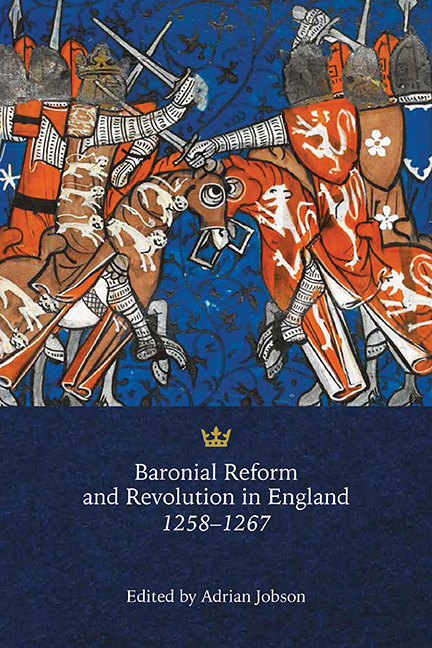Book contents
- Frontmatter
- Dedication
- Contents
- List of Illustrations
- Acknowledgements
- List of Abbreviations
- Introduction
- Modern Historians and the Period of Reform and Rebellion, 1258–1265
- The Secret Revolution of 1258
- Baronial Reform, the Justiciar’s Court and Commercial Legislation: The Case of Grimsby
- Crisis Management: Baronial Reform at the Exchequer
- Local Administration during the Period of Reform and Rebellion
- What Happened in 1261?
- Writing Reform and Rebellion
- Civic Government in Troubled Times: London c.1263–1270
- The Montfortian Bishops
- Reformers and Royalists: Aristocratic Women in Politics, 1258–1267
- The Midlands Knights and the Barons’ War: The Warwickshire Evidence
- Retinues, Agents and Garrisons during the Barons’ Wars
- The Barons’ War in the North of England, 1264–1265
- The Maritime Theatre, 1258–1267
- Reasserting Medieval Kingship: King Henry III and the Dictum of Kenilworth
- Index
Retinues, Agents and Garrisons during the Barons’ Wars
Published online by Cambridge University Press: 21 May 2021
- Frontmatter
- Dedication
- Contents
- List of Illustrations
- Acknowledgements
- List of Abbreviations
- Introduction
- Modern Historians and the Period of Reform and Rebellion, 1258–1265
- The Secret Revolution of 1258
- Baronial Reform, the Justiciar’s Court and Commercial Legislation: The Case of Grimsby
- Crisis Management: Baronial Reform at the Exchequer
- Local Administration during the Period of Reform and Rebellion
- What Happened in 1261?
- Writing Reform and Rebellion
- Civic Government in Troubled Times: London c.1263–1270
- The Montfortian Bishops
- Reformers and Royalists: Aristocratic Women in Politics, 1258–1267
- The Midlands Knights and the Barons’ War: The Warwickshire Evidence
- Retinues, Agents and Garrisons during the Barons’ Wars
- The Barons’ War in the North of England, 1264–1265
- The Maritime Theatre, 1258–1267
- Reasserting Medieval Kingship: King Henry III and the Dictum of Kenilworth
- Index
Summary
In his Studies in the Period of Baronial Reform and Rebellion , E.F. Jacob drew attention to the high incidence of ‘manorial spoliation’ that took place during the period of the Barons’ Wars. Although he emphasised the wanton pillaging of the royalists’ lands by ‘men of neighbouring vills or townships’ and the widespread settling of ‘grudges’ that took place between the battles of Lewes and Evesham, he was also struck by the thorough and systematic way in which the attacks on the properties of prominent royalists, officials and ‘special councillors’ was undertaken. He explained this in terms of ‘emissaries … passing to and fro the country encouraging both communities and individuals to attack the estates of royalists’. What I want to do in this essay is to look further at the deployment of physical force and intimidation by the rebels during the period of upheaval, with a view to assessing how organised and targeted it actually was. Three related phenomena will be examined: the operation of retinues or, more correctly, sub-retinues; the role of procuratores , or agents; and the actions of castle garrisons.
I will approach the subject as Jacob did, through the assize rolls dealing with cases heard before the special eyre held between 1267 and 1272. The eyre was commissioned as part of the pacification process following the wars and was occasioned by the peace made by the king and the earl of Gloucester in June 1267. Gloucester had championed the cause of the ‘disinherited’, those landowners who had suffered seizure or confiscation after the battle of Evesham and who had consequently decided to fight on. The justices received their first commissions on 17 September 1267. The eyre's proceedings survive for a number of counties, including three of the four Midland counties whose cases were heard before Nicholas of Yattendon and his fellow justices. The cases that came before the justices were essentially of two kinds, one dealing with the record of lands granted or seized from rebels and considered redeemable under the Dictum of Kenilworth of 1266, and the other with presentments and complaints of offences committed during the whole period of disturbance in the realm. It is the latter with which we will be principally concerned here. redemption of land, but with the light the records cast on the rebels’ actions in the localities during the period 1263–65.
- Type
- Chapter
- Information
- Baronial Reform and Revolution in England, 1258-1267 , pp. 183 - 198Publisher: Boydell & BrewerPrint publication year: 2016



